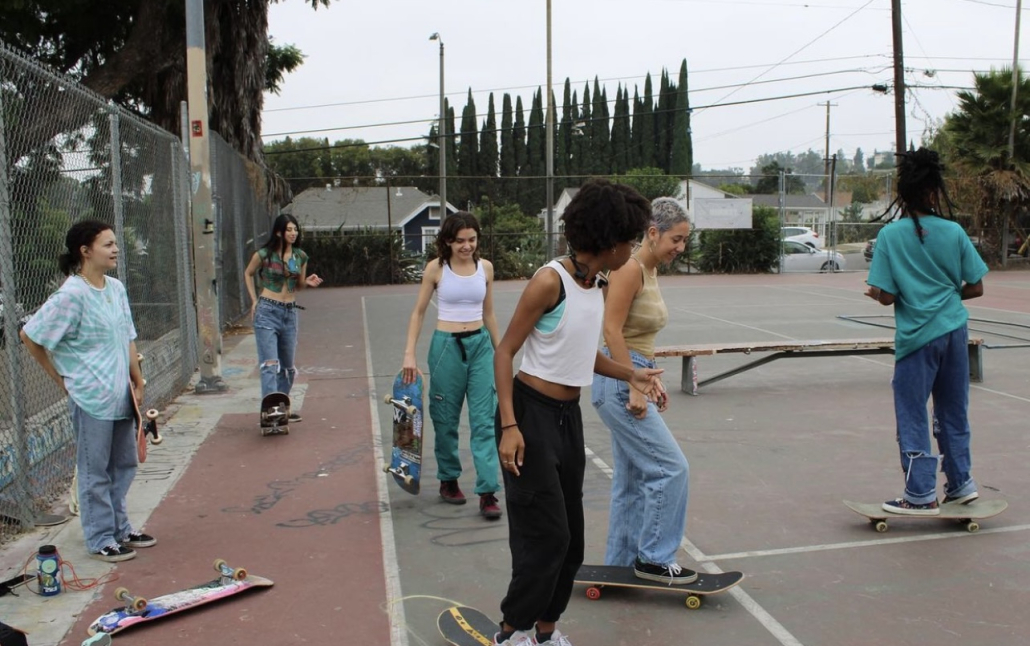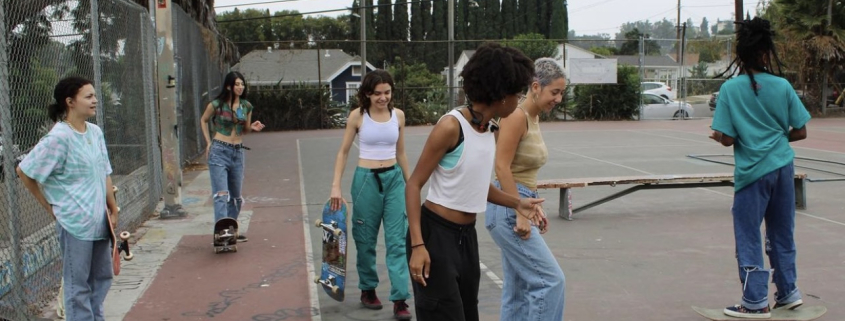Aunt Skatie provides inclusivity for skaters

Maggie Bowen, founder of Aunt Skatie, began her skateboarding journey after her mother mistakenly gave her a skateboard for Christmas — instead of the longboard she asked for — when she was just eight years old.
Arriving at USC in 2018, Bowen began to explore all that skateboarding had to offer. During her freshman year, Bowen met with a group of friends from her floor and a male skater who proceeded to invite her to go with him to a skate park.
During the meetup, Bowen said she primarily helped the skater record his tricks.
“He was super cool for taking me there to the park, and we had a great day, but he was also kind of like ‘I want you to film me,’” said Bowen, now a senior majoring in narrative studies. “Because I was a beginner, he was like, ‘I don’t want to waste my time teaching you. I just want to get clips and leave.’ And so I was kind of bummed out about that.”
According to a Los Angeles Times article highlighting USC’s research on the activity, skateboarding has proven to be life changing for many, allowing for community, stress relief and collaboration. Despite generally being considered a welcoming space, the sport’s benefits can often be clouded for underrepresented groups and LGBTQIA skaters who find difficulty in navigating the cis-male dominated space.
Zoë Corwin, a research professor and primary contributor to the USC Skate Studies research team — a project dedicated to exploring the experiences, hardships and day-to-day lives of skaters — notes this disconnect.
“[White cis-gendered men] have a belief that skateboarding is open to everyone — ‘You skate, I skate, we’re all the same. I have no issue with you being part of my skate world,’” Corwin said. “But that’s not necessarily experienced the same way by someone who has a marginalized identity.”
Despite Bowen feeling underestimated during her experience with the male skater, she defines that point as when she took skating more seriously, spending the following summer perfecting her craft.
The next semester, Bowen founded Aunt Skatie, an organization dedicated to providing a safe space for women, LGBTQ+ and non-binary skaters to feel motivated in an environment that they could call their own. Inspired by her involvement in Girls Who Code — where she served as a teacher’s assistant for the group’s summer immersion program — Bowen looked to translate the organization’s mission to the skateboarding realm.
“I loved Girls Who Code’s mission of ‘Be brave, not perfect.’ … There’s less of that fear of failure and more resilience,” Bowen said. “I wanted that in skateboarding because I would go to the park and would see like no girls.”
Aunt Skatie’s name stems from when Bowen found relief in seeing another girl, Katie Korneta, at the Wilson Skate Park in Chicago. Korneta, a professional baker and community organizer who coordinates skating sessions and competitions, would later invite her to compete in an all-girls competition that Bowen described as having “magnetic energy.” Bowen also uses Aunt Skatie’s name to pay homage to her Aunt Katie.
Unaffiliated with USC, the group had to find creative ways to spread the word about Aunt Skatie. During this time, Bowen could often be found frantically chasing down potential members on Trousdale Parkway, handing out flyers about the organization’s first meetup.
Despite the difficulties that arise from Aunt Skatie’s non-affiliation, Bowen enjoys the freedom that comes with it.
“We don’t have to fill out a ton of paperwork. We’re not limited by the University in what we can do and say,” Bowen said. “And it’s not just limited to that population … There are people that are outside USC that have joined.”
Since then, the organization has grown to roughly 30 members, with some of the early members of Aunt Skatie continuing to stay actively involved.
Danielle Haase, a first-year graduate student studying neuroscience, joined Aunt Skatie in its first year as a junior after she and her friend discovered the organization on Instagram. Haase credits Aunt Skatie for building up her confidence, particularly with her skating abilities.
“I would not have gone to a skate park before Aunt Skatie,” Haase said. “When I had [gone] in the past, it was just all these men, and I felt scared to even throw down my board because I felt like I didn’t deserve to take up that space … But it’s a lot easier to take up that space when you’re in a group of people who are similar to you and are encouraging you.”
One of Haase’s most solidified memories with Aunt Skatie involved inviting a young girl to join their group after noticing she was skating alone.
“A bunch of the Aunt Skatie girls were trying to include her a lot, and we started a train with all of us skating around the park with her. It was really cute.” Haase said.
In contrast, skaters such as Pilar Luiz, a junior majoring in computer engineering and computer science, recently joined Aunt Skatie, attending her first meetup in mid-February. Luiz said she already recognizes Aunt Skatie’s role in allowing marginalized groups to truly feel seen in the sport they participate in.
“A lot of times, we fall into the narratives perpetuated by societal standards, which is white males skateboarding,” Luiz said. “Aunt Skatie is offering a new narrative for minorities, females and LGBTQ+ communities and presenting a possibility that you can be a part of this narrative and not excluded from it.”
Although Luiz acknowledges that people who look to start skating may feel intimidated, she urges new skaters to look past their fears.
“Everyone feels intimidated. I feel intimidated. But I’ve never had a time where someone has not been willing to help,” Luiz said. “I’d say don’t be afraid to be a beginner. It’s kind of a beautiful thing to be a beginner.”
Bowen said she hopes the legacy of Aunt Skatie continues long after she graduates. To promote its longevity, she is working to establish an executive board that would alleviate the stress of running the organization alone. Bowen intends to create more opportunities for Aunt Skatie and the inclusive community they are trying to build.
Additionally, Bowen is considering other ways Aunt Skatie can actively give back to the community, debating ways to become a more structured organization.
“Ideally, I just want to have fun so we can run more events,” Bowen said. “I’m considering making it a LLC and then donating to charity if we ever make additional funds.”
Corwin commends Aunt Skatie for creating a welcoming and stress-free space for underrepresented gender and LGBTQIA skaters to improve their skills.
“Groups like Aunt Skatie allow people space to improve their skills in a safe space so when they go to a place of more skilled skaters they have a little bit more experience under their belt,” Corwin said. “It’s hard to go cold into any space. And, so, if you know you’re going to go to a place where you’re going to be with people that are similarly minded and you’re meeting up at the same time, it’s fun.”
Aunt Skatie coordinates most of its meetups and events primarily through its Instagram account — @auntskatie. New members of any level, whether they attend USC or not, are always welcome to join.

